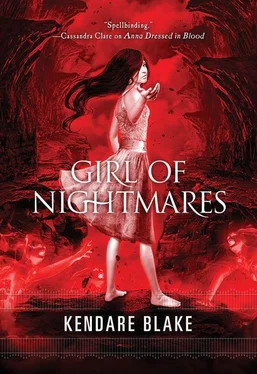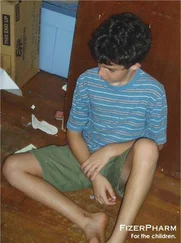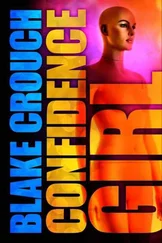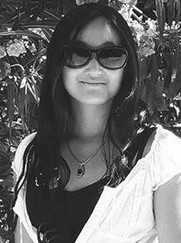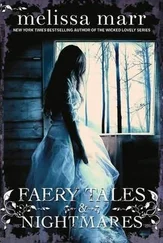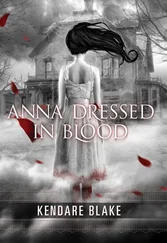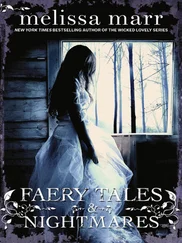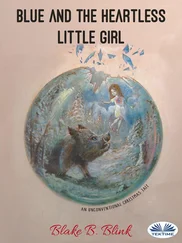“Huh?”
I blink. Carmel’s friend Nat is turned around in her seat, squinting at me curiously. Then she shrugs.
“You’re probably right.” She glances toward Mr. Dixon, who has gone to sit at his desk to mess with something on his laptop. “He probably doesn’t care if we talk about the war for real. So.” She sighs, looking like she’d rather be sitting in front of anyone else. “You going to come with Carmel to the senior party?”
“Isn’t that just for seniors?” I ask.
“Come on. It’s not like they’re going to card you and kick you out if you’re not one,” she scoffs. “Well, maybe if you were a freshman. Thomas could even come. Cas? Cas?”
“Yeah,” I hear myself say. But not really. Because Nat’s face isn’t her face anymore. It’s Anna’s. The mouth moves with hers, but not the expression. Like a mask.
“You’re acting really weird today,” she says.
“Sorry. My Percocet’s wearing off,” I mutter, and slide out of the desk. Mr. Dixon doesn’t even notice when I walk out of the classroom.
When Thomas and Carmel find me, I’m sitting on the quiet stage in the middle of the theater, staring up at the rows of blue-covered seats, all empty except for one. My trig text and notebook are beside me in a neat stack, as a reminder of where I’m supposed to be.
“Is he catatonic?” Thomas asks. They came in a few minutes ago but I didn’t acknowledge them. If I’m going to ignore one friend I may as well ignore them all.
“Hey guys,” I say. Their movements echo loudly through the empty theater as they drop their books and climb up onto the stage.
“You do a pretty good job of avoiding things,” says Carmel. “But then again maybe not. Nat says that you were acting weird during discussion questions in history.”
I shrug. “Anna’s face transposed over hers while she was talking. I thought I showed a fair amount of restraint.”
They exchange one of their ever more frequent looks as they sit on either side of me.
“What else have you seen?” Thomas asks.
“She’s in pain. Like she’s being tortured. She was in my room last night. There were wounds, opening and closing on her arms and shoulders. I couldn’t do anything to help her. She wasn’t really there.”
He pushes his glasses up on his nose. “We have to find out what’s going on. That’s—that’s sick. There must be a spell, something to reveal—”
“Maybe mysticism isn’t what we need right now,” Carmel interjects. “What about something else, like maybe a psychologist?”
“They’d just drug him to the gills. Tell him he’s got ADD or something. And besides, Cas isn’t insane.”
“Not to be a downer, but schizophrenia can strike at any time,” she says. “It’s actually common for it to manifest around our age. And the hallucinations seem just as real as you or me.”
“What are you talking about schizophrenia for?” Thomas blurts.
“I’m not saying that specifically! But he’s been through a significant loss. None of it might be real. Have you seen anything? Have you even felt anything weird like your grandpa said?”
“No, but I’ve sort of been slacking off in my voodoo studies. I’ve got trigonometry, you know?”
“I’m just saying it doesn’t always have to be spirits and magic. Sometimes hauntings are in your mind. It doesn’t make them less real.”
Thomas nods and takes a breath. “Okay, that’s true. But I still think a shrink is the wrong way to go.”
Carmel makes a growling noise. “Why do you have to jump straight to a spell? Why are you so sure it’s paranormal?”
This is as close as I’ve ever heard to a Thomas and Carmel argument. And as special as it is to listen to your friends argue over whether or not you have a mental illness, I’m starting to get the urge to go back to class.
Stop poking your nose around where it doesn’t belong, before someone cuts it off. There’s something else going on around you, like a storm.
I don’t care.
In the sixth row of the theater, in the third chair in, Anna winks at me. Or maybe she just blinks. I can’t tell. She’s missing half of her face.
“Let’s go talk to Morfran,” I say.
* * *
The bell over the antique shop door jingles and there’s the click-click-clatter of dog toenails on hardwood before Stella collides with my legs. I give her a few scratches and she gazes up at me with huge brown eyes like a seal pup’s before moving on to Carmel.
We aren’t the only ones in the shop. Morfran’s talking to two women, forty-something ladies in sweaters asking questions about one of the china washbasins. Morfran laughs and starts telling them a cozy little historical tale that may or may not be true. It’s weird to watch him with customers. He’s so nice . We try not to make too much of a ruckus on our way to the back room. After a few minutes, we hear the women saying good-bye to Stella and thank you to Morfran, and seconds later, he and the dog walk through the curtain into the back, where he keeps the stranger and more obscure occult supplies. My mom’s candles enjoy a table in the front window. She’s gone mainstream.
The way Morfran’s looking at me, I expect him to produce one of those doctor’s flashlights and check my pupil response. His arms are crossed over his chest, bunching up the black leather of his vest and covering the Aerosmith logo on his t-shirt. When Thomas tosses him a freshly packed pipe of tobacco, his hand shoots up and catches it, and his eyes never leave my face. It’s hard to believe that the kindly antique shop proprietor and this man of dark magic are one and the same.
“You kids here for an after-school snack?” he asks as he lights up. Then he checks his watch. “Can’t be. School’s not out for another five hours.”
Thomas clears his throat uncomfortably, and Morfran’s furry eyebrow lifts in his direction
“You flunk out and you’ll be picking crud out of everything I buy up at swap meets this summer.”
“I’m not flunking out. It’s the last two weeks. Nobody even cares anymore really.”
“I care. Your mama cares. And don’t you forget it.” He nods at Carmel. “What about you?”
“Perfect grade point average,” she replies. “And it’ll stay that way. It’s all about results, my dad says.” Her smile is sweet, apologetic but confident. Morfran shakes his head.
“You talk to that Brit friend of yours?” he asks me.
“Yeah.”
“What’d he say?”
“He said to let it go.”
“Good advice.” He draws on his pipe; the smoke obscures his face as he exhales.
“I can’t take it.”
“You should.”
Carmel steps forward, her arms crossed over her chest. “Why should he? Can you stop being so cryptic? Maybe if you’d just tell us what’s going on, tell us why we should let it go, then maybe we would.”
He exhales and looks away from her, sets his pipe down on the glass countertop. “Can’t tell you what I don’t know. It’s not an exact science. Not a news bulletin. It just blinks up, in here,” he says, and points to his chest. “Or in here”—he points to his temple. “It says stay away. It says let it go. People are watching you. The kind of people you don’t mind just watching, but you hope they never show up. And there’s something else.” He draws again on the pipe, looking thoughtful, which is really the only way you can look when smoking a pipe. “Something is trying to hold this back, while another thing is trying to draw it on. And that’s the thing that concerns me most, you want to know the truth. Makes it hard to hold my tongue.”
“Hard to hold your tongue on what?” I ask. “What do you know?”
Читать дальше
